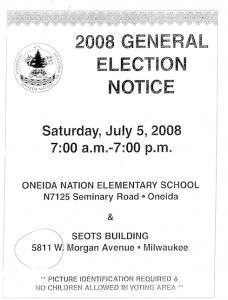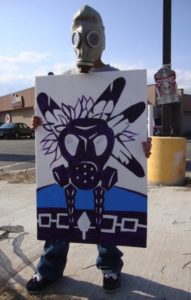In her May 20, 2013 Petition to eliminate the Tribal triennial elections polling site at the Southeast Oneida Tribal Services facility in Milwaukee, petitioner Carole Liggins wrote the following:
WHEREAS, the Oneida Business Committee in 2002 adopted BC Resolution #3-13-02-O which established a second polling site for Oneida triennial elections in Milwaukee, WI, authorized and directed the Oneida Police Chief to provide (2) Oneida Police Officers for the second polling site, and approved Fifteen Thousand Dollars ($15,000) from the General Fund to cover the triennial election costs; and
WHEREAS, the Oneida Police Officers at the second polling site are out of their jurisdiction and therefore have no authority; and
WHEREAS, the 2005 General Election Final Report indicates 183 persons cast a ballot at the second polling site; and
WHEREAS, the 2011 Primary Election Final Report indicates 136 persons cast a ballot at the second site with a cost of $7,519.04; and
WHEREAS, the 2011 General Election Final Report indicates 200 persons cast a ballot at the second polling site with a cost of $6236.19[.]
While the numbers cited do prove that the SEOTS polling site did generate enough votes to have a decisive impact on overall vote totals, did you notice what’s missing regarding Carole’s account of the “triennial” elections?
Any mention of the 2008 General Election. Hmm.
Perhaps that’s due to violations of Oneida Election Law which are reported to have occurred under the authority of Oneida Election Board Chair Racquel ‘Rocky’ Hill in 2008 which are addressed below, and, for the record, Carole Liggins was a member of the Oneida Election Board during this period of time.
Linda Dallas’ August 6, 2008 Request for Injunctive Relief re: Docket #08-TC-108, Linda Dallas v. Oneida Elections Board and Oneida Business Committee, claimed that the Oneida Election Board
pursued action at the Oneida Appeals Commission level with the intent to eliminate the Milwaukee Polling Site even after the Oneida General Tribal Council took official action to “Table” (on or near the Annual 2008 GTC Meeting) the Oneida Election Law until a date that would be set in October 2008. It is important to note that the Oneida Election Board was not successful in their attempt to eliminate the polling site
and to that effect Dallas included a copy of a September 17, 2007 Memorandum by Election Board Chair Racquel ‘Rocky’ Hill to Attorney Francine Skenandore which requested that a resolution be drafted in an attempt to rescind BC Resolution 03-12-02-O based on Chair Hill’s strange claims that
the Oneida Tribe does not have jurisdiction in Milwaukee…therefore the polling site is UNCONSTITUTIONAL
and that
…the voter turnout at the polls in Milwaukee has shown a decline in the numbers from 2002 (264 voters) and 2005 (183 voters). The polling site in Milwaukee is not fiscally responsible. It also creates a greater disconnect from those enrolled members residing in Milwaukee with the Oneida community who reside within the original reservation boundaries.
Despite Rocky Hill’s all-caps claim that the Milwaukee polling site was somehow ‘unconstitutional,’ the Legislative Operating Committee had issued months prior to Ms. Hill’s memo its own March 7, 2002 ‘Statement of Effect’ which concluded,
There are no legal issues which would preclude adoption of this Resolution.
Rocky Hill’s memo demonstrates that Carole Liggins’ revived claims that
the Oneida Tribe’s financial state today has been dramatically diminished since the adoption of BC Resolution #3-13-02-O
is simply a tired repeat claim that doesn’t pass the smell test, and instead suggests that Hill & Liggins have simply been trying to find any grounds on which to disenfranchise Oneidas who reside in southern Wisconsin, or Illinois and Indiana, rather than on the Oneida reservation, and as shown below Hill has no business complaining about fluctuation in voter turnout.
But what was Rocky Hill trying to insinuate by claiming that SEOTS’ Milwaukee polling site “creates a greater disconnect from those enrolled members residing in Milwaukee with the Oneida community who reside within the original reservation boundaries“?
Is she suggesting that SEOTS shouldn’t exist at all and that people shouldn’t consider themselves Oneidas unless they punch-in enough times on the reservation? Or is Rocky Hill’s statement a ‘tell’ as to what her real motives are, which might be to exclude those Oneidas who choose to live further south due to the employment and housing limitations of the Oneida Tribe and reservation, and are thus immune to other local social ‘influences’?
An alarming example of incompetence – or an overt attempt to disenfranchise non-reservation residing Oneidas – that occurred on Election Board Chair Rocky Hill’s watch which likely explains why Carole Liggins’ petition omits any mention of the 2008 General Election turnout in Liggins’ 2013 petition is this (pages 11-12):
The ENTIRE voting population received notice via first class mail that stated “2008 GENERAL ELECTION NOTICE, Saturday, July 5, 2008 7:00 a.m. –p.m., ONEIDA NATION ELEMENTARY SCHOOL, N7125 Seminary Road – Oneida, SEOTS Building, 5811 Morgan Avenue – Milwaukee”. This is inaccurate notice of the “place of the election.” The CORRECT address of the “place of the election” for the Milwuakee Polling Site was 6811 Morgan Avenue – Milwaukee. The Oneida Election Board was provided notice of this error and attempted to correct the situation. However, the Oneida Election Board failed to correct the improper notice in a timely manner as voters residing in, around, outside of and south (Chicago, Indiana, etc.) of the Milwaukee area did not receive the corrected notice of the Milwaukee “place of the election” uncial AFTER the election. Milwaukee residents reported receiving their corrected notice on Monday July 7, 2008; Tuesday, July 8, 2008 and Wednesday, July 9, 2008. Voters from Madison reported traveling to the Milwaukee Polling Site that was noticed to them as being located at 5811 Morgan Avenue – Milwaukee. Upon arrival there was no polling site in sight and no one and/or nothing to send them to the right place. These activities violated all the voters right to the noticed of the “place of the election.”
Here is a copy of the Oneida Election Board’s 2008 General Election misdirection, intentional or otherwise:
How can that kind of unprofessional misinformation by Rocky Hill and the Election Board that Carole Liggins was a member of, that required additional printing and mailing which still failed to reach Oneida voters in a timely manner, possibly be considered “fiscally responsible”?
The Request for Injunctive Relief regarding the 2008 General Election also outlines the Election Board Chair’s improper handling of and destruction of Election Board records, and also includes several affidavits and sworn statements by Tribe members who witnessed processing problems with behavior by the electronic ballot machines, improper behavior by poll attendees imposing themselves and invading the privacy of the voters, as well as the absence of the Oneida Police Officers whose assignments would seem to be a sizable portion of the costs of the General Election.
[Ostensibly the videos which were supposed to be taken of the ballot box could clear up questions of intimidation tactics or violation of voter privacy, but good luck getting access to the tapes. Now Oneida Eye has learned that there are attempts to remove the necessity of a video record of ballot box integrity from the Election Law. Wonder why.]
Those are each very serious matters that reflect poorly on the integrity of the electoral process and could engender disenchantment with political participation, but Linda Dallas also notes that despite the fact that the Oneida Election Law, Section 2.9-7 states that,
The sealed ballots shall be locked or otherwise sealed to prevent tampering and delivered to the Oneida Records Management Department for responsibility of retainment.
Nevertheless, it was Dallas’ contention that based on the July 15, 2008 Oneida Election Board Meeting Minutes, Board Chair Rocky Hill violated that mandate, and states (page 17):
1. Oneida Election Board Chairwoman Racquel ‘Rocky’ Hill was not authorized to possess the accu-vote tabulator ballot box and/or the election ballots, and
2. Oneida Election Board Chairwoman Racquel ‘Rocky’ Hill was not authorized to possess the accu-vote tabulator ballot box and/or the election ballots at her place of residence.
Further (page 18):
Nowhere in in the Oneida Election Law, or any other Law (Oneida or otherwise) is Oneida Election Board Chairwoman [Rocky Hill], any other Oneida Election Board Member or any other person (no matter their position or status), allowed to personally or collectively possess the the accu-vote tabulator ballot box or ballots.
Linda Dallas sums up that her request for injunctive relief is not about the 2008 winners and losers (page 20):
It is about fairness, honesty and the integrity of the 2008 Oneida General Election. With these three key elements missing from our 2008 Oneida General Elections the Oneida Tribe is [destined] to more forward with a substantial lack of trust and minimal loyalty toward the current and future elected government officials[.]
Given all of these critical failures – or attempts at voter suppression or dirty tricks – how can Carole Liggins cite prior turnout as a basis for her petition which will only further disenfranchise those voters who do want to participate in elections without unnecessary hardships of travel, job, family, health constraints, when past turnouts don’t necessarily indicate voter apathy but rather a justifiable lack of confidence in the integrity of the Tribe’s electoral process, not to mention the possibly questionable quality of the majority of candidates?
As for the bogus ‘fiscal responsibility’ concern trolling, Tribal CFO Larry Barton said at the October 9, 2013 Community Meeting that the financial impact of the secondary polling site is “minuscule” and that the Tribe might be able to save as much as $100,000 on utility bills simply by turning the lights off in the Norbert Hill Center and other buildings at night, concluding regarding the costs of the secondary polling site, “I don’t see a financial argument there whatsoever.”
It seems rather obvious to Oneida Eye what Hill’s and Liggins’ real problem with SEOTS hosting a polling site boils down to:
Rocky & Carole don’t approve of the impact of the SEOTS polling site on Tribal elections including who people are voting for, and instead want to find a way to protect those candidates that voters at the secondary location might be – with good reason – voting against.

